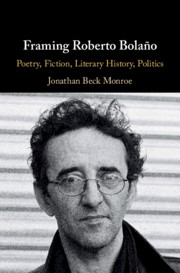Book contents
- Framing Roberto Bolaño
- Framing Roberto Bolaño
- Copyright page
- Dedication
- Contents
- Acknowledgments
- Abbreviations
- Introduction Unpacking Bolaño’s Library
- Part One
- Part Two
- Part Three
- Chapter 6 Dismantling Narrative Drive
- Chapter 7 Making Visible the “Non-Power” of Poetry
- Chapter 8 Poetry, Politics, Critique
- Part Four
- Conclusion From the Known to the Unknown University
- Notes
- Index
Chapter 8 - Poetry, Politics, Critique
By Night in Chile (Nocturno de Chile)
from Part Three
Published online by Cambridge University Press: 09 September 2019
- Framing Roberto Bolaño
- Framing Roberto Bolaño
- Copyright page
- Dedication
- Contents
- Acknowledgments
- Abbreviations
- Introduction Unpacking Bolaño’s Library
- Part One
- Part Two
- Part Three
- Chapter 6 Dismantling Narrative Drive
- Chapter 7 Making Visible the “Non-Power” of Poetry
- Chapter 8 Poetry, Politics, Critique
- Part Four
- Conclusion From the Known to the Unknown University
- Notes
- Index
Summary
Returning a year after the publication of Amulet to the site of the historical trauma of his generation, Bolaño’s 2000 novella By Night in Chile resumes the challenge of a coming-to-terms with the 1973 coup which he had made his sustained focus, four years earlier, in Distant Star. Combining Distant Star’s focus on poiesis with that of Amulet on aesthesis, By Night in Chile completes Bolaño’s trilogy of short novels of poetic apprenticeship by exploring the conjunction of poiesis and aesthesis in a single character who figures both, the Catholic father/priest and poet-critic Sebastián Urrutia Lacroix/H. Ibacache. Mirroring the central protagonist’s dual identities as poet (Urrutia Lacroix) and critic (Ibacache), the text inscribes, through its uninterrupted monological structure, a maximal tension between acts of writing and reading. Pivoting in the novella’s final pages to an explicit focus on politics, pedagogy, and the making of literature, Bolaño suggest the extent to which relations between readers and writers, history and literary history, ideology and critique remain to be determined through the dynamic interplay of aesthesis and poiesis, an increasingly accelerated process that carries within it the potential, though far from a guarantee, of more democratic, non-binary configurations to come.
Keywords
- Type
- Chapter
- Information
- Framing Roberto BolañoPoetry, Fiction, Literary History, Politics, pp. 142 - 152Publisher: Cambridge University PressPrint publication year: 2019

